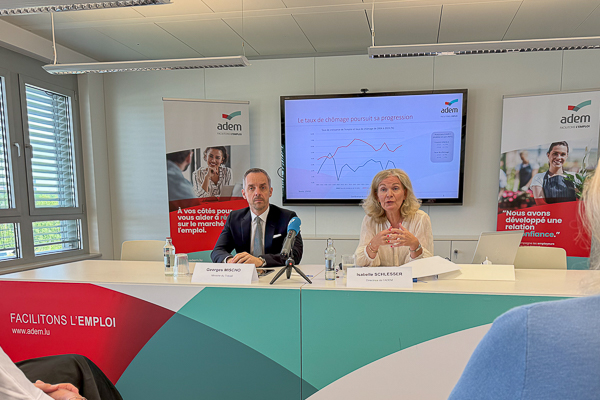 (L-R) Georges Mischo, Luxembourg's Minister of Labour; Isabelle Schlesser, ADEM Director;
Credit: Ievgenii Karanov, Chronicle.lu
(L-R) Georges Mischo, Luxembourg's Minister of Labour; Isabelle Schlesser, ADEM Director;
Credit: Ievgenii Karanov, Chronicle.lu
On Wednesday 9 July 2025, Luxembourg employment agency ADEM presented its annual report for 2024.
During a press conference held in the presence of Georges Mischo, Luxembourg's Minister of Labour, ADEM Director Isabelle Schlesser presented the 2024 annual report and highlighted key labour market trends and the agency’s strategic priorities.
According to ADEM, the modest improvement seen at the beginning of this year has not fundamentally changed the situation that has persisted since 2023: the labour market is weakening, and key indicators show a clear slowdown. Despite a slight employment growth of 0.9% in 2024, this figure remains historically low for Luxembourg, where growth rates traditionally exceeded 2% or even 3% in previous years. The number of people employed in Luxembourg reached 515,870, marking a 0.9% increase year-on-year.
In an interview with Chronicle.lu, Isabelle Schlesser commented on the current state of the labour market: “I think the most important point to notice is really that we still had some growth in the labour market, but really not the same growth as we used to have the years before. So we were not even at 1% growth rate, and we used to be at 2, 3, 3.5%.” She added: “And this has enormous implication on recruitments, on of course the number of job seekers, because job seekers find it harder to find new opportunities to go on with their professional life. So I think that's the main point when it comes to the labour market.”
According to STATEC forecasts, domestic employment growth is expected to reach 1% in 2025 and rise slightly to 1.5% in 2026, compared to a growth rate exceeding 3% in 2021.
The employment agency noted that the number of job vacancies reported to ADEM fell by 15% in 2024 compared to the previous year, with a total of 36,707 positions declared. Of these, 5,935 remained unfilled at the end of the year.
As of 31 December 2024, ADEM recorded a total of 19,532 registered resident jobseekers, representing a 7.3% increase over the previous year. Among them, 11,746 individuals received full unemployment benefits, a year-on-year increase of 10.6%. Additionally, 4,111 jobseekers were participating in active labour market measures, up 0.6% compared to 2023. The seasonally adjusted unemployment rate rose from 5.5% in December 2023 to 5.9% in December 2024, up by 0.4 percentage points.
At the same time, the number of jobseekers registered with ADEM increased by 7% in 2024. The national unemployment rate stood at 5.9% at the end of December 2024 and rose slightly to 6.0% as of 31 May 2025, representing 18,469 registered jobseekers. According to STATEC projections, the rate is expected to remain relatively stable over the coming months, reaching 5.9% in 2026.
Despite an increase in the number of registered jobseekers, recruitment challenges remain. ADEM Director Isabelle Schlesser noted that “despite the rising number of jobseekers, recruitment difficulties persist.”
In response, ADEM launched a new series of studies in 2024 aimed at better understanding both current and emerging labour market trends. One such study, recently published in the Zoom Emploi report focusing on IT professions, illustrates how rapidly employers’ skill requirements have evolved - often varying significantly across companies.
ADEM reported that, to support better career orientation and re-skilling efforts, it launched a new interactive dashboard, JobInsights.lu, in 2024. The tool offers real-time insights into sector-specific skill needs, experience requirements and occupations experiencing growth or decline. Schlesser described the platform as “a promising tool, not only for young people seeking career guidance but also for jobseekers and employees looking to retrain.”
Labour Minister Georges Mischo reiterated “the essential role of ADEM in supporting and developing jobseekers’ employability through upskilling and reskilling solutions”. He stressed that such programmes are “fundamental to reducing the skills gap between employer requirements and candidate qualifications”.
As part of its strategic training initiatives, ADEM organises sector-specific courses throughout the year, many of which are accessible without formal qualifications - particularly benefiting low-skilled jobseekers. These trainings aim to address concrete employer needs and facilitate rapid and sustainable integration or reintegration into the labour market.
This investment in skills development has resulted in a sharp increase in training participation. In 2024, a total of 9,170 jobseekers attended at least one training course, a 78.3% increase compared to 2023, with nearly 14,000 total course participations recorded (compared to 7,579 in 2023). According to ADEM, the proportion of registered jobseekers who followed training within the past twelve months has increased sevenfold since 2019, reflecting growing demand for both in-person and digital learning solutions.
As part of its 2025 strategy, ADEM is continuing to modernise its services with a focus on innovation and digitalisation. “We are continuing the rollout of our ADEM 2025 strategy, supporting our main clients, jobseekers, employees and employers, and enhancing our service offering through innovations aligned with citizen expectations, while improving internal efficiency,” noted Isabelle Schlesser.
In this context, the employment agency has launched a redesigned version of its Employment Portal (adem.lu), developed in collaboration with the State Information Technology Centre (CTIE). The revamped site, made available in June 2025, aims to offer more intuitive navigation and facilitate access to relevant information and documents. The platform is available in French, German and English and includes practical features such as call-to-action buttons ("I register", "I’m interested in apprenticeships", "I declare a vacancy") and a dedicated training page enabling users to search for courses based on sector, skills, language or target audience.
Described as “a first step toward a more interactive site allowing for many online procedures,” the new portal will continue to evolve. ADEM confirmed that the next stage of digitalisation will focus on unemployment benefits, with a new online application system and a personalised ADEM space via MyGuichet.lu expected to go live in November 2025. Additional digital services are set to follow progressively.








